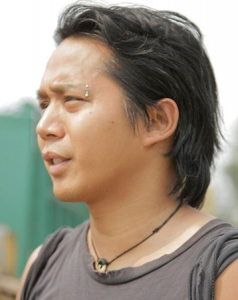‘Graceland’ explores how the Filipino crosses boundary of good and evil
By Cristina DC PastorNothing about “Graceland” remotely suggests Elvis Presley, although “Heartbreak Hotel” comes close.
Ron Morales’ second Filipino film, which will open on April 26, is the story of a family chauffeur whose life falls apart following the abduction of his daughter. The destiny of Marlon Villar runs in tandem with that of his lecherous boss, Congressman Manuel Chango. Both find themselves in a complicated socio-political predicament where one needs the other to be able to survive.
“Graceland” has been garnering rave reviews, including one from Unseen Films’ DB Burrows who rated it “one of the best films of Tribeca 2012.”
The New Jersey-born Morales had always immersed himself in the arts, such as music, painting, sculpture and mixed media, growing up. He studied photography at Parsons School of Design and later switched to film at NYU’s Tisch School of the Arts. Film was a natural progression, he said. “I could combine all of the media that I have been working with throughout my life.”
He began as a grip for an Indian soap opera, and got hired for numerous acclaimed films, such as “Michael Clayton” and “The Departed.” A well-rounded filmmaker, he has also worked as a writer, editor, and a member of the art department before becoming a full-fledged director.
“Times were tough and jobs in film in New York were scarce at the time because of September 11th. I saw the benefit of gripping,” he told The FilAm in an interview. “It was my chance to observe the craft, watch performances from talented actors and work with filmmakers.”
Although U.S.-based, he visits the Philippines as often as he can. Like “Graceland,” his debut film “Santa Mesa” — which is an investigation into his FilAm roots — was also filmed in the Philippines.
Morales discusses the complicated thriller “Graceland” in the following interview.
TF: Why is the film titled Graceland?
RM: In the world that I created, each of my characters is either corrupt or corrupting one another. In a nutshell they are all falling from grace — a land without grace. The moral thread of the story is a comment on how susceptible humanity is to right and wrong.
TF: What is the message of the film?
RM: We are what we are. People will do almost anything in their power to save their loved ones even if the actions are morally wrong. We all are susceptible to the evils within humanity. The boundary between good and evil and rich and poor might be closer than we think.
TF: The central character, Marlon, is passive throughout the movie. The viewer is led to think he is going to have a ‘high moment’ but there is none.
RM: I wanted to keep the central hero true to the dramatic character sketch of reality. In the Philippines most of the time drivers and other domestic staff tend to be passive. I believe this comes from an underrepresented community and also a colonialist mentality that still resonates within the culture of the everyday psyche of the Filipino mindset.
TF: Is ‘Graceland’ a big budget movie? What is the cost?
RM: I wish I had a big budget, but it is hard to find funding. Very few people are willing to take a chance on filmmakers. It was a very low budget film, which was partially self-financed and partially supported by family and friends through Kickstarter.
TF: What role did movies play in your life?
RM: Story is everything to me. It is not easy to write and create stories. I admire filmmakers like Stanley Kubrick, Terrence Malick, Lukas Moodysson and Steven Soderbergh, directors who can make films that hold true to their artistic integrity but also reach the masses commercially.
TF: The movie seems to show the seedy side of the Philippines – poverty, organized crime, political corruption, child prostitution, etc. Don’t you think that’s too much social malaise for one country?
RM: The fact is that these social issues exist in the Philippines. However, those issues are universal and are as relevant in the Philippines as they are here in the United States. The difference is that it is more visible in the Philippines, but of course, it is difficult to compare.
I incorporated those issues due to that they were relevant to make the story realistic. As well, I am foremost a storyteller, and to be able to write story you have to listen to other people’s experience. I interviewed many sex workers, and their stories are heartbreaking. It was important for me to at least give them a voice and not turn a blind eye.
TF: What did foreign audiences love about the film? Is it the plot, the technical aspect about being a tightly paced thriller, the acting?
RM: Wherever I have shown the film, I receive great feedback, especially from Filipinos. The film has won four awards, including the Audience Award at the Gasparilla Film Festival in Tampa I received a couple of weeks ago. The film also received seven nominations at 29th PMPC Star Awards for Movies 2013.
I have always hoped that this film would entertain, be socially relevant and could break into the U.S. market, especially a Filipino film. As Filipinos, we need this voice in Hollywood. It is important that Filipino cinema is rising like Korean and other Asian cinema. As of now we don’t have that and I urge our Fil-Am community to support not only my film, but also the new wave of independent cinema that is coming from our homeland.
“Graceland” is available on VOD and will be in theaters on Friday, April 26. The film is being distributed by DraftHouse Films. Click here to buy tickets to screenings.
 Trust our award-winning law firm with your immigration case.
Trust our award-winning law firm with your immigration case.














Will this be available at any of the Bay Area theaters?